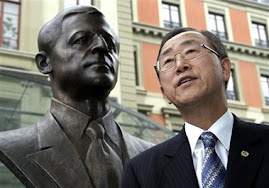History
In late June 2000, the Executive Committee of the Council of the University for Peace (UPEACE), headquartered in San José , Costa Rica , authorized the Rector to set up an Institute for Media, Peace and Security (IMPS) within the framework of the university. The Institute came into formal existence on November 7, 2000. Its administrative office is in Geneva as one of several offices that will eventually operate under the Council's authority.
Mandate
The Institute – "an intellectual tool for preventive diplomacy" -- aims to educate people in the many ways the media interact with issues of conflict, peace and security. It welcomes two kinds of participants: persons from areas of recent, current or potential conflict; and persons from countries or organizations strongly concerned with international peace and security. Its research program feeds directly into the classroom, targeting international questions in which the media play a significant role. By its education and research programs, and by its day-to-day contacts with UN and regional peacekeeping bodies and partner organizations, the Institute hopes to contribute to new thinking about how free media can help prevent conflict – and to alert decision-makers, as well as the general public, to looming risks of war.
Independence and Practicality
Kofi Annan, UN Secretary General, Honorary President, University for Peace
Like the University for Peace as a whole, the Institute is independent of day-to-day policy or administrative control by the United Nations. But because the University was created in 1980 by Resolution of the UN General Assembly, the Institute will try to make its work as useful as possible to the UN, especially for peacekeeping and conflict prevention. It will also work with regional peace and security organizations such as the OSCE, NATO, the African Union, the Organization of American States (OAS), and the Association of Southeast Asian Nations (ASEAN). It will keep aware of the challenges they face and adapt its teaching and research to help them develop practical solutions.
Values: Free Media, Democracy
The Institute's courses, research and other activities will aim to develop and strengthen free media worldwide. Free media being an indispensable foundation of democracy, and democracy tending more often than not to serve peace, our action ultimately aims to help prevent international conflict. As a small, specialized organization, we intend to work with any other organizations or groups pursuing similar goals. (...).
Link,http://www.mediapeace.org/about_us.cfm, consultado a 15 de Outubro de 2006.
In late June 2000, the Executive Committee of the Council of the University for Peace (UPEACE), headquartered in San José , Costa Rica , authorized the Rector to set up an Institute for Media, Peace and Security (IMPS) within the framework of the university. The Institute came into formal existence on November 7, 2000. Its administrative office is in Geneva as one of several offices that will eventually operate under the Council's authority.
Mandate
The Institute – "an intellectual tool for preventive diplomacy" -- aims to educate people in the many ways the media interact with issues of conflict, peace and security. It welcomes two kinds of participants: persons from areas of recent, current or potential conflict; and persons from countries or organizations strongly concerned with international peace and security. Its research program feeds directly into the classroom, targeting international questions in which the media play a significant role. By its education and research programs, and by its day-to-day contacts with UN and regional peacekeeping bodies and partner organizations, the Institute hopes to contribute to new thinking about how free media can help prevent conflict – and to alert decision-makers, as well as the general public, to looming risks of war.
Independence and Practicality
Kofi Annan, UN Secretary General, Honorary President, University for Peace
Like the University for Peace as a whole, the Institute is independent of day-to-day policy or administrative control by the United Nations. But because the University was created in 1980 by Resolution of the UN General Assembly, the Institute will try to make its work as useful as possible to the UN, especially for peacekeeping and conflict prevention. It will also work with regional peace and security organizations such as the OSCE, NATO, the African Union, the Organization of American States (OAS), and the Association of Southeast Asian Nations (ASEAN). It will keep aware of the challenges they face and adapt its teaching and research to help them develop practical solutions.
Values: Free Media, Democracy
The Institute's courses, research and other activities will aim to develop and strengthen free media worldwide. Free media being an indispensable foundation of democracy, and democracy tending more often than not to serve peace, our action ultimately aims to help prevent international conflict. As a small, specialized organization, we intend to work with any other organizations or groups pursuing similar goals. (...).
Link,http://www.mediapeace.org/about_us.cfm, consultado a 15 de Outubro de 2006.





